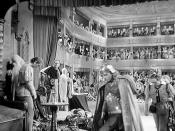The Presentation and Function of Fortinbra in Hamlet In Hamlet, Fortinbras is a young prince who immediately raises an army after he learns of his fatheráæs death. Before he finally appears on stage in Act Four, other characters represent him as a capable leader and general. Because of Fortinbrasáæ skills, the dying Hamlet requests that Fortinbras be elected the next king of Denmark. The similarities and differences between Fortinbras and Hamlet make Fortinbras a character foil for Hamlet. Thus, Fortinbras functions as a reference point to reveal more about Hamletáæs personality. By comparing Fortinbrasáæ decisiveness with Hamletáæs inaction, we can gain a deeper understanding of Hamlet. Fortinbrasáæ function as a character foil to Hamlet will be illustrated by discussing their initial situations, different reactions, and final outcomes.
Fortinbrasáæ initial situation is similar to Hamletáæs. Hamlet is a prince who must decide whether he should take revenge for his fatheráæs death.
On the other hand, Fortinbras is the prince of Norway whose father died at the hands of Old Hamlet. Hamletáæs uncle rules Denmark even though hamlet should be the king. Similarily, Fortinbrasáæ uncle rules Norway and even though Fortinbras should be the king. True, each characteráæs father has been killed, and each character has lost his rightful place on the throne.
Nevertheless, the two men have varied reactions towards his fathersáæ death. Fortinbras represents the pure type of soldier, so he reacts like one and immediately seeks revenge. He is a man of action who does not seem to worry much about all consequences of his actions. It is difficult to determine much about him since he appears only twice in the play but, the descriptions of Fortinbras suggests that he would be a perfect person to put in command of an army. For example, Hamlet says that Fortinbras has the courage to expose áçWhat is mortal and unsure / To all that fortune, death, and danger dareáè (4.4.51-52). When he hears of his fatheráæs death, he raises an army to avenge his father. As well, he also wants to recover immediately the land that Norway had to turn over to Denmark. As Horatio explains, Fortinbras wants áçTo recover of [Denmark] by strong hand / And terms compulsatory, those foresaid lands / So by his father lostáè (1.1.101-103) This comment reveals that Fortinbras is a man of action who takes action instantly by raising an army and going on the march.
Like Fortinbras, Hamlet also has come good reasons to take immediate action. However, he reacts like a philosopher, not a soldier. Hamlet is not like the pure soldier because he has to debate everything with himself before he can take action. As a result, he wastes too much time with his decision-making. For example, when Hamlet draws his sword out when Claudius is praying, Hamlet decides not to kill Claudius then because if he died while praying he would be absolved of his sins. Hamlet tells himself, áçNow I might do it pat, now áÃÂ¥a is a-praying. / And now Iáæll doáæt áV and so áÃÂ¥a goes to heaven, / And so am I revened. That would be scanned áç (3.3.73-75). Hamlet means, áçThis needs consideration.áè Before he can kill Claudius, Hamlet needs to think about all the consequences. Only then will be taking the action to kill Claudius to avenge his father. Hamlet worries too much about the goals that he should accomplish and is more of a thinker than a warlike hero. In contrast to Fortinbras, Hamlet does nothing for a long time before he finally decides to take revenge.
The different outcomes of Fortinbras and Hamlet reinforce the significance of the other differences between them. Hamlet compares himself with Fortinbras in Act Four. Hamlet realizes that his problem is áçthinking too precisely on the eventáè (4.4.41). His understanding makes him frustrated with himself. He states, áç I do not know / why yet I live to say áÃÂ¥This thingáæs to do,áæ / Sith I have cause, and will, and strength, and means, / To doáætáè (4.4.43-46). In contrast, Fortinbras áçmakes mouths at the invisible eventáè (4.4.50) and is on his way to attack Poland. The example of Fortinbras makes Hamlet realize that he must take decisive action: áçO, from this time forth, / My thoughts be bloody, or be nothing worth!áè(4.4.65-66). However, the outcome of Hamletáæs decision to act is different from that of Fortinbras. Hamlet finally succeeds in killing Claudius. However, laertes, and Gertrude, and Hamlet himself are all killed as well. At the end of the play, the contrast between Hamlet and Fortinbras is very clear. Hamlet is dead, and Fortinbras is standing over him, áç with drum, colors, and attendantsáè (Act Five). As well, Fortinbras has just won a military victory in Poland. He has defeated an entire army and is triumphant. In contrast, Hamlet is killed while defeating just one man. Before he dies, Hamlet recognizes that Fortinbras would make an excellent king for Denmark: áç I cannot live to hear the news from England, / But I do prophesy tháæ election lights / on Fortinbras áç (5.2.324-326) Fortinbras, not Hamlet is a leader, and a ruler.
Through Hamlet, Fortinbras function as a character foil for Hamlet. Their basic situations at the beginning of the play are very similars. However, their reactions and outcomes are almost completely different. Fortinbras is a man of action, whereas Hamlet is a man of thought. The contrast





